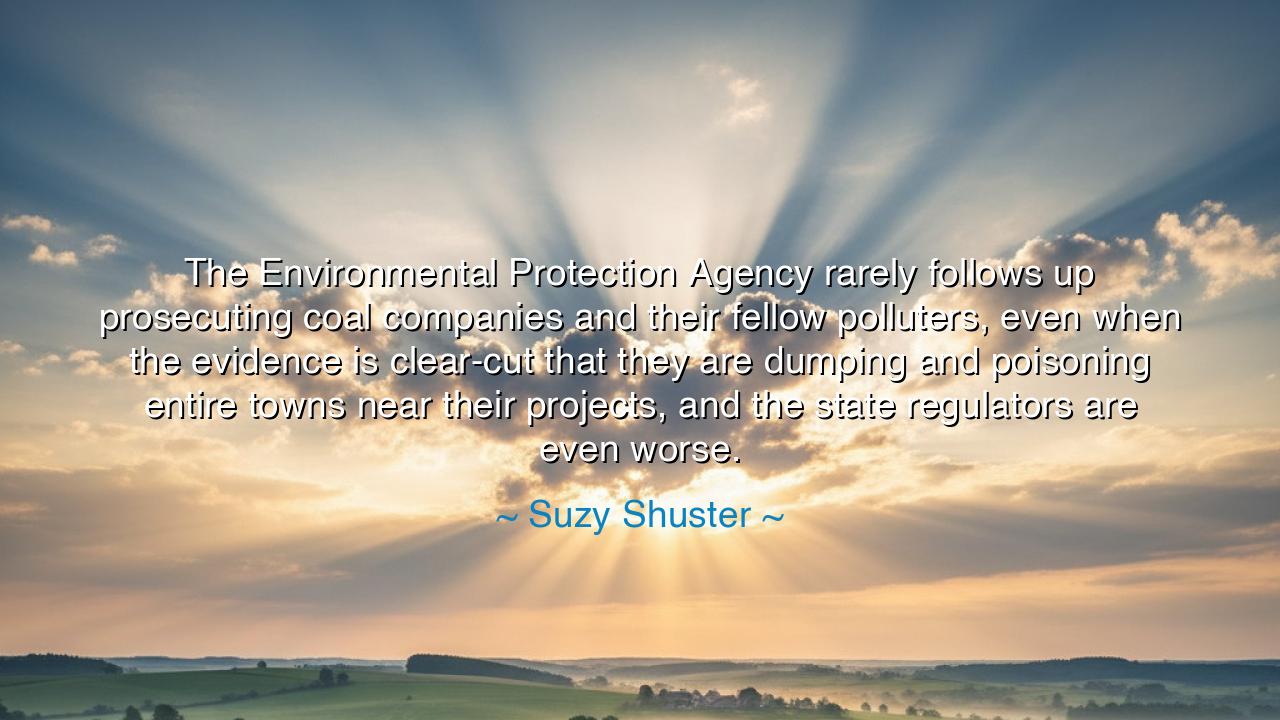
The Environmental Protection Agency rarely follows up prosecuting
The Environmental Protection Agency rarely follows up prosecuting coal companies and their fellow polluters, even when the evidence is clear-cut that they are dumping and poisoning entire towns near their projects, and the state regulators are even worse.






Hear the cry of Suzy Shuster, who bore witness to the desecration of earth and community, and who spoke these words with the force of lament and accusation: “The Environmental Protection Agency rarely follows up prosecuting coal companies and their fellow polluters, even when the evidence is clear-cut that they are dumping and poisoning entire towns near their projects, and the state regulators are even worse.” These are not idle words, but a torch lifted high, exposing the shadows where power and negligence conspire. She names the guardians who have grown weary or complicit, and the plunderers who spread poison in pursuit of profit.
The origin of this saying is rooted in the long history of industrial might clashing with the health of people and land. In America, coal has for centuries fueled light, heat, and wealth. Yet it has also left a legacy of broken mountains, blackened rivers, and sickened children. The EPA, founded in 1970 as a shield for the people, too often turns its face away, weakened by politics or captured by the very industries it was sworn to watch. State regulators, who should have stood as defenders of their own people, have at times bent their knee to the coal barons who feed their treasuries. Thus, Shuster names the betrayal: those entrusted with protection instead become silent accomplices.
Consider the story of Central Appalachia, where coal companies hollowed mountains with explosives and cast the rubble into streams, burying valleys in toxic waste. Towns downriver watched their wells turn foul, their air turn heavy with coal dust, their children fall ill with cancers and breathing sickness. The evidence was plain, the suffering undeniable. Yet prosecutions were rare, and fines, when levied, were but pennies compared to profits. The people cried out for justice, but the courts and regulators moved slowly, if at all. This is the living canvas upon which Shuster’s words were painted: a tale not of ignorance, but of willful neglect.
Such stories echo across the ages. In ancient Rome, the aqueducts once carried fresh water to the people, but when greed allowed lead pipes to spread poison, few in power dared to act. In London of the nineteenth century, the “Great Stink” filled the Thames with human and industrial waste until cholera claimed thousands. In both cases, the authorities ignored the evidence until the suffering grew too vast to deny. And so we see the eternal lesson: when regulators fail to act, when those sworn to protect the people betray their charge, the people themselves bear the cost in sickness, poverty, and despair.
Yet Shuster’s words are not only an accusation—they are a call to vigilance. For if the mighty institutions falter, then the power of the people must rise. Communities have sued, protested, and resisted. In West Virginia, mothers brought jars of poisoned water to courtrooms and legislatures, demanding clean rivers for their children. In Flint, Michigan, citizens revealed the truth of poisoned pipes to a nation. These battles are proof that the guardianship of earth and people cannot rest in the hands of officials alone; it belongs to all who breathe the air and drink the water.
The lesson is clear: trust not blindly in distant protectors. Demand accountability of the EPA, of state regulators, of all who hold power. Stand with those who resist exploitation, and refuse to let the cries of poisoned towns be drowned by the clinking of coins. Let each person remember that the law exists to protect the weak from the strong, not to shield the strong from consequence. When justice fails, it is the duty of the people to kindle it anew.
And what shall you do, O listener? Live with eyes open. Question where your power and light come from. Support leaders and laws that hold polluters to account. Choose, when you can, the path of energy that does not poison the earth. Speak when others are silent. For silence is the ally of corruption, but truth spoken boldly can shake empires.
So remember the teaching of Suzy Shuster: when those entrusted with protection fail, the people must become their own defenders. Guard the earth, guard the water, guard your neighbor’s health as you would your own. For if towns are poisoned and nothing is done, then the betrayal is not only by rulers, but by all who turned away. Let us turn not away, but toward justice, until the rivers run clean again.






AAdministratorAdministrator
Welcome, honored guests. Please leave a comment, we will respond soon